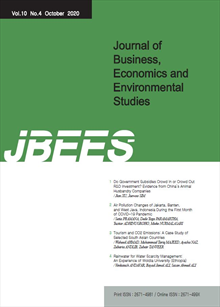간행물
The Journal of Business, Economics, and Environmental Studies KCI 등재

- 발행기관 한국유통과학회
- 자료유형 학술지
- 간기 계간
- ISSN 2671-4981 (Print)2671-499X (Online)
- 수록기간 2011 ~ 2020
- 주제분류 사회과학 > 경영학 사회과학 분류의 다른 간행물
- 십진분류KDC 325DDC 330
권호리스트/논문검색
Vol.9 No. 1 (2019년 1월) 4건
1.
2019.01
서비스 종료(열람 제한)
Purpose - This study aims to explore and describe human resource management (HRM) in Nepalese organizations. Specifically, this study addresses three research questions: (a) what are the key human resource (HR) practices in Nepalese organizations?; (b) what are the major tasks and roles of HR departments in Nepalese organizations?; and (c) how is the status of the HR function expected to change within Nepalese organizations?
Research design, data, and methodology - For this purpose, we implemented the Delphi method and developed an informed consensus among selected experts concerning the research questions.
Results - The findings illustrate that organizations in Nepal adopt a wide range of HR practices commonly used in Western and developed countries. Simultaneously, some HR practices specific to the Nepalese context are also discovered. The experts’ consensus on the future of HRM confirms that the evolution of the HR function to a strategic partner of management is evident in Nepalese organizations.
Conclusions – Domestic as well as foreign organizations in Nepal try to create HRM systems that place them on a par with global companies. At the same time, they incorporate cultural features specific to Nepal to compete effectively in local markets. While there are few empirical studies describing HR practices in Nepal, this study contributes to broadening our understanding of the current and future status of HRM in Nepal.
2.
2019.01
서비스 종료(열람 제한)
Purpose - The purpose of this paper is to find out the determinants of the quality of financial information in the financial environment of the cement companies of Bangladesh.
Research design, data and methodology - This study considers a total of fifty-eight firm years as the sample from the seven listed cement companies of Bangladesh during the period of 2007 to 2015. This study applies the multivariate regression analysis including the pooled OLS, panel and controlling time.
Results - This study finds that profitability and external financing are the two major explanatory variables in determining the quality of financial information. This study also finds that firm size and accrual quality don’t have any significant influence on quality of financial information.
Conclusion - This study observed that profitability of this sector which is much volatile and prone to be manipulated. Thus, this paper suggests that higher profitability needs more scrutiny while assessing quality of financial information. Finally, this study provides some indications for future research such as considering the listed firms of other sectors of Bangladesh or cross country comparison in different country setting.
3.
2019.01
서비스 종료(열람 제한)
Purpose - The purpose of this paper is to investigate the relationship between corporate social responsibility disclosure (CSRD) and investment-cash flow sensitivity, which is a surrogate for financing constraints.
Research design, data, and methodology – Taking China’s A-share listed companies between 2009 and 2016 as a sample, this paper empirically tests the relationship between CSRD and investment-cash flow sensitivity by Panel VAR model. By introducing the orthogonal impulse response function, this paper distinguishes the fundamental factors and financial ones that affect corporate investment behavior.
Results – Findings indicate that: (1) investment-cash flow sensitivity of firms with low level of CSRD is significantly lower than that of firms with high level of CSRD; (2) the orthogonal impulse response of corporate investment to cash flow in firms with high level of CSRD is significantly different from zero, but it is not significant in firms with low level of CSRD; (3) for firms with low level of CSRD, 0.7% of corporate investment volatility can be explained by the change in cash flow, which is lower than that of firms with high level of CSRD (1.1%).
Conclusions - Corporations disclosing more and higher quality CSRD are often those faced with financing constraints. Voluntary disclosure can help them alleviate information asymmetry and financing constraints.
Short Communication
4.
2019.01
서비스 종료(열람 제한)
Purpose – The aim of this paper is to examine the newly formed a partnership of Amazon, Berkshire Hathaway (Berkshire) and JPMorgan through the lens of strategic alliance, corporate philanthropy, and corporate social responsibility.
Research design, data, and methodology – This is an analytical case study that examines the existing scholarly articles in strategic alliances, corporate philanthropy, and corporate social responsibility to explain the recent strategic alliance.
Results - There is a clear limitation in explaining this type of unconventional strategic alliance with exiting definitions and concepts because there is no existing study or case available today. Forming a strategic business alliance to create and operate healthcare for their domestic employees could be viewed as a social innovation that resulted from an effort to resolve a social problem, the ineffective healthcare system in the U.S., rather than focusing on business benefits and profits.
Conclusions – The success or failure of this type of business alliance would certainly affect the current healthcare system of the United States and global businesses and healthcare industries in the future. However, just entering or tapping into uncharted territory by these three companies to deal with a social issue is significant enough to merit further exploration and analysis for scholars and practitioners.

